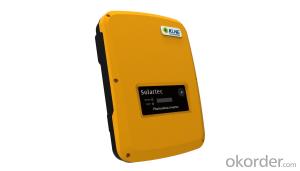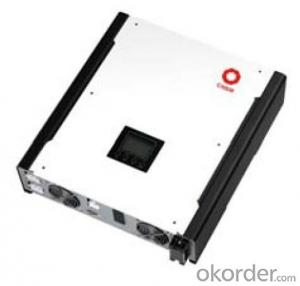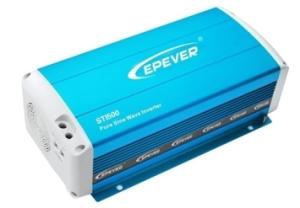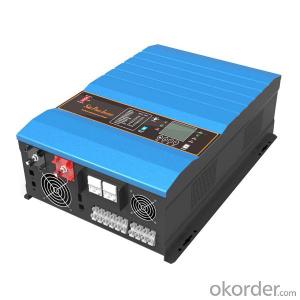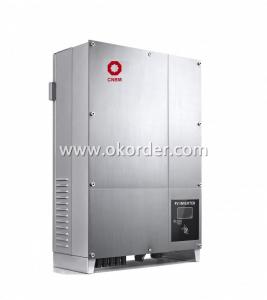ON-GRID INVERTER Solartec 1500/2000
- Loading Port:
- China Main Port
- Payment Terms:
- TT OR LC
- Min Order Qty:
- -
- Supply Capability:
- -
OKorder Service Pledge
Quality Product, Order Online Tracking, Timely Delivery
OKorder Financial Service
Credit Rating, Credit Services, Credit Purchasing
You Might Also Like
The Solartec 1500~5000 series is applicable to various rooftops and small scale photovoltaic grid-connected power plants. Their nominal output powers are 1.5 kW, 2 kW, 2.5 kW, 3 kW, 3.6 kW, 4 kW, 4.6 kW and 5kW respectively.
This series is transformerless and has a wide range of MPPT input voltage. Its maximum conversion efficiency and MPPT tracking accuracy reach 97.6 % and 99.5 % respectively. The maximum DC voltage reaches 550 V. Its multilingual LCD display facilitates easy operation. It has integrated DC switch and waterproof direct plug-in terminals. It has overvoltage, islanding, short-circuit, overloading and overheating protection functions. Its IP65 protection degree will ensure that it runs well in various tough environments.
Efficient
■ Efficiency of up to 97.6 %
■ Transformerless
■ Efficiency of up to 97.6 %
■ Transformerless
Safe
■ Integrated DC switch
■ Comprehensive protection functions
Flexible
■ LCD backlight
■ For indoor and outdoor installation
Simple
■ ‘Plug and play’connection for easy installation
■ Friendly interface, easy to install and maintain
- Q:How does a solar inverter handle voltage and frequency variations caused by grid disturbances?
- A solar inverter is designed to handle voltage and frequency variations caused by grid disturbances by regulating and stabilizing the incoming AC power from the grid. It constantly monitors the voltage and frequency levels of the grid and adjusts its internal components accordingly to ensure that the power being generated by the solar panels is synchronized with the grid. In cases of voltage or frequency deviations, the inverter employs advanced control algorithms to rectify the imbalances and maintain a steady flow of power to the grid. This helps to protect the electrical appliances and equipment connected to the grid from potential damage and ensures the stability and reliability of the overall power system.
- Q:Can a solar inverter be used off-grid?
- Yes, a solar inverter can be used off-grid. Off-grid systems typically include a solar panel array, a charge controller, batteries for energy storage, and an inverter to convert the stored DC (direct current) electricity from the batteries into AC (alternating current) electricity for use in off-grid applications. The inverter plays a crucial role in converting the DC power from the solar panels or batteries into usable AC power, making it possible to power various appliances and devices off-grid using solar energy.
- Q:What is the role of a solar inverter in reactive power compensation during grid disturbances?
- The role of a solar inverter in reactive power compensation during grid disturbances is to regulate and stabilize the flow of reactive power from the solar panels to the grid. During grid disturbances, such as voltage fluctuations or power imbalances, the inverter adjusts the reactive power output to maintain grid stability and improve power quality. By injecting or absorbing reactive power as needed, the solar inverter helps to maintain the grid voltage within acceptable limits and minimize disruptions in the power supply.
- Q:Can a solar inverter be used with a solar-powered security system?
- Yes, a solar inverter can be used with a solar-powered security system. A solar inverter is essential for converting the direct current (DC) generated by solar panels into alternating current (AC) that can be used to power the security system. By using a solar inverter, the solar-powered security system can efficiently utilize and store the energy generated by solar panels, ensuring continuous operation even during periods of low sunlight.
- Q:Can a solar inverter be installed in a residential area?
- Yes, a solar inverter can be installed in a residential area. In fact, residential areas are one of the most common locations for solar power installations, including solar inverters. These inverters help convert the DC electricity generated by solar panels into AC electricity that can be used to power homes and other electrical devices.
- Q:Solar grid inverter does not merge into the grid, direct access to the load to the load power supply?
- Inverter is the DC power (battery, battery) into alternating current (usually 220V, 50Hz sine wave). It consists of inverter bridge, control logic and filter circuit
- Q:Can a solar inverter be used in a stand-alone solar system?
- Yes, a solar inverter can be used in a stand-alone solar system. In fact, it is an essential component as it converts the direct current (DC) generated by the solar panels into alternating current (AC) that can be used to power electrical devices in a standalone system.
- Q:What certifications should a solar inverter have?
- A solar inverter should have certifications such as UL 1741, IEC 62109, and IEEE 1547 to ensure its compliance with safety standards, grid interconnection requirements, and performance reliability.
- Q:How does the efficiency of a solar inverter affect the overall system performance?
- The efficiency of a solar inverter plays a critical role in determining the overall system performance. A higher efficiency inverter converts a greater percentage of the incoming solar energy into usable electricity, resulting in increased energy production. This ultimately leads to higher system output and improved performance. Additionally, a more efficient inverter reduces energy losses and improves the overall system's reliability and longevity. Lower efficiency inverters, on the other hand, can result in energy wastage and reduced system performance. Therefore, selecting a highly efficient solar inverter is essential for maximizing the overall performance and energy output of a solar power system.
- Q:Can a solar inverter be used in a solar-powered irrigation system?
- Yes, a solar inverter can be used in a solar-powered irrigation system. A solar inverter is responsible for converting the direct current (DC) produced by solar panels into alternating current (AC), which is necessary for powering electrical devices such as pumps and motors in an irrigation system. By connecting the solar panels to a solar inverter, the energy generated by the sun can be efficiently utilized to operate the irrigation system, making it a sustainable and cost-effective solution for agricultural purposes.
1. Manufacturer Overview |
|
|---|---|
| Location | |
| Year Established | |
| Annual Output Value | |
| Main Markets | |
| Company Certifications | |
2. Manufacturer Certificates |
|
|---|---|
| a) Certification Name | |
| Range | |
| Reference | |
| Validity Period | |
3. Manufacturer Capability |
|
|---|---|
| a)Trade Capacity | |
| Nearest Port | |
| Export Percentage | |
| No.of Employees in Trade Department | |
| Language Spoken: | |
| b)Factory Information | |
| Factory Size: | |
| No. of Production Lines | |
| Contract Manufacturing | |
| Product Price Range | |
Send your message to us
ON-GRID INVERTER Solartec 1500/2000
- Loading Port:
- China Main Port
- Payment Terms:
- TT OR LC
- Min Order Qty:
- -
- Supply Capability:
- -
OKorder Service Pledge
Quality Product, Order Online Tracking, Timely Delivery
OKorder Financial Service
Credit Rating, Credit Services, Credit Purchasing
Similar products
New products
Hot products
Hot Searches
Related keywords
